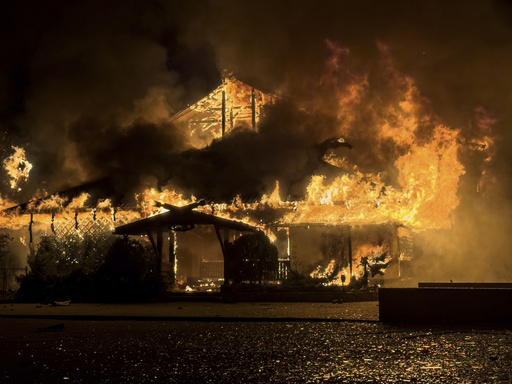
KYIV, Ukraine — The outcome of the upcoming U.S. presidential election is seen as pivotal for the ongoing war in Ukraine. The military assistance that Ukraine receives from its primary international ally hinges significantly on who assumes the role of U.S. president, as well as any potential cease-fire that could offer relief to the nation. Many officials in Kyiv feel that the future of Ukraine is closely tied to the results of the election.
As Americans head to the polls, Ukrainian forces, fatigued yet resolute, are holding their defensive positions under relentless Russian bombardment, acutely aware that the election results will shape their fate in the ongoing conflict. The war in Ukraine stands out as one of the most polarizing topics in the presidential race, with Republican candidate Donald Trump and Democratic nominee Vice President Kamala Harris presenting starkly different views on the level of American support that should continue for Ukraine.
In a bid to outline his “victory plan,” Ukrainian President Volodymyr Zelenskyy and his administration have recently engaged in an extensive outreach to Western nations. They are hoping that the next U.S. administration will make critical decisions regarding Ukraine’s aspirations for NATO membership and ongoing military support. However, for now, they must remain in a state of anticipation.
Mykhailo Podolyak, an advisor to Zelenskyy, expressed optimism, stating, “We are confident that regardless of the president’s name, the United States will maintain its global leadership and this is fundamentally linked to supporting Ukraine and overcoming the Russian Federation.”
If Harris wins, it is expected that she would largely uphold President Joe Biden’s policies. Harris has openly criticized Russian President Vladimir Putin’s “brutality” and would likely continue to support Ukraine, albeit with constraints on Ukraine’s operations within Russian territory that have left some Ukrainian officials feeling frustrated.
Malcom Chalmers, from the Royal United Services Institute in London, noted, “Biden has established from the outset that avoiding a full-scale war with Russia is his primary goal, and I believe that remains the main American focus.” Since Russia initiated hostilities in February 2022, the U.S. has committed over $59.5 billion in military equipment and aid to Ukraine. However, Kyiv has often found itself caught in the crosshairs of contentious U.S. politics, which has impeded its capacity on the battlefield.
As a result of protracted delays in U.S. aid packages, Ukraine has faced losses in territory and personnel, and promised military assistance has frequently been late or insufficient. Ukrainian leaders continue to seek approval for long-range strikes inside Russian territory, while they also possess areas in the Kursk region of Russia after a recent incursion.
Despite these setbacks, Biden’s support for Ukraine has remained firm. Recently, Defense Secretary Lloyd Austin announced a $400 million military aid package, with expectations for an additional $800 million directed towards enhancing Ukraine’s long-range capabilities. An estimated $8 billion is projected to be allocated by the end of the year. However, some skeptics argue that these efforts come too late.
General Lieutenant Ihor Romanenko, former deputy chief of the General Staff, commented, “Had the promised aid been delivered on time, we could have approached negotiations with Russia from a stronger position.”
In contrast, Trump has long questioned the amount of aid extended to Ukraine, making ambiguous promises to end the conflict, alongside showing admiration for Putin. His unpredictable nature raises concerns among some Ukrainian officials, who believe this could expedite resolution. However, the ambiguity around Trump’s decisions creates uncertainty regarding his potential actions.
Chalmers remarked, “Trump underscores the risk that the United States may significantly scale back or altogether halt military support to Ukraine, which is a dire prospect given the current dynamics favoring Russia.” Podolyak believes Trump grasps the essence of Zelenskyy’s strategy, stressing the need for Russia to comprehend the realities of war rather than engaging in negotiations that lack pressure.
Within Ukraine, anxiety persists that Trump could cease military support, a scenario that would leave Ukrainian forces vulnerable, as no other ally could replicate U.S. backing. Ukrainian troops emphasize their determination to maintain their defensive positions, but the implications of reduced support could be grave, potentially coercing Kyiv into accepting unacceptable cease-fire terms with a significant portion of its land under Russian control.
Romanenko warned, “If aid is terminated, the situation could deteriorate rapidly,” adding, “The pace of territorial loss is uncertain, but the potential for additional seizures remains.”
Zelenskyy has shared his vision for concluding the conflict with both prominent candidates, advocating for urgent action on NATO membership. He has openly discussed the need for a potential partial cease-fire while grappling with the complexities surrounding Russian-occupied territories.
To sustain its war efforts, Russia has allocated a significant portion of its budget to defense, although it has faced steep personnel losses. The reported addition of North Korean troops underlines Moscow’s challenges with domestic conscription pressures. Conversely, Ukraine grapples with its own struggles, facing mounting pressure on its energy infrastructure and supply chains.
In summation, Chalmers highlighted that resolution can only be achieved if both parties perceive a net benefit in doing so. He voiced concerns regarding the uncertainty in the months ahead, as Russia may exploit perceived advantages to extract greater concessions from Ukraine. Zelenskyy’s approach embodies a recognition of this reality; hence, his administration insists that dialogue with Russia must involve firm accountability rather than persuasion.
“I stress, ‘We lack nuclear deterrence, are not in NATO, and won’t join during the conflict. Therefore, I require this support, and it cannot be denied,’” Zelenskyy recounted while addressing the necessity of foreign assistance to fortify Ukraine’s position.
